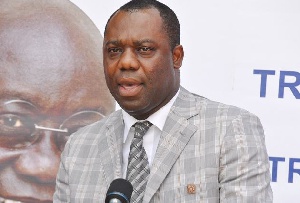 Dr. Matthew Opoku-Prempeh, the Minister of Education
Dr. Matthew Opoku-Prempeh, the Minister of Education
The various University Councils or Boards of Governors may have to make the necessary adjustments and exceptions, of course. I am talking about the pronouncement by Dr. Matthew Opoku-Prempeh, the Minister of Education, that henceforth all candidates desirous of securing tenure-track teaching appointments at any of the various public tertiary academies in the country would, perforce, need to acquire the doctoral degree in their respective disciplines of training or specialty beforehand (See “Only PhD Holders to Teach in Universities – Education Minister” Graphic.com.gh / Ghanaweb.com 11/20/18).
One does not suppose that this policy will be enforced or implemented overnight, for it is highly unlikely to succeed, given the fact that there are not many doctoral-degree holders in the country who could be counted upon to immediately take up teaching positions at any of the major public universities in the country. Not even here in the United States do our universities, both public and private, produce an adequate number of doctoral-degree holders to fill up the various departments and colleges in our universities. I haven’t checked the figures lately, but at the State University of New York-sponsored community college where I have been teaching for some two decades, we were ranked at the top of our institutional tier or level, when our administrators decided to raise the faculty-hiring or qualifications bar from the master’s degree to the PhD level.
The percentage of faculty members with the doctorate shot up to 42-percentage points, from something on a previous order of 30-percent or thereabouts. And the interesting thing to note here is that we live in a country that produces the highest number of doctorates annually, quite a remarkable percentage of which are obtained by foreign students, largely from countries like Japan, India and China and several other European countries who depart the United States shortly after completing these terminal degrees. An alternative teaching requirement that prevails in the United States, at least in the second-largest state public university system in which I work, is to obtain a second master’s degree if an already actively engaged faculty member or lecturer does not possess a doctorate, that is about the only way that an untenured or unvested lecturer or professor can be guaranteed occupational security.
But, of course, not all faculty, both prospective and actively engaged, have to go by the two processes of employment or hiring discussed above. There are faculty members as well as prospective faculty members who get hired who transition into the system by dint of genius talent and globally significant and recognized intellectual, scholarly or creative output or productivity. And there are legion examples of such personalities all over the African continent. In the humanities, such intellectual and cultural giants sport names like Chinua Achebe, late, Dennis Brutus, late, Wole Soyinka and Ngugi wa Thiong’O. These literary artists and wits are in a rarefied class by themselves. And, oh, I forgot to add the name of our own Ms. Ama Ata Aidoo. And when they have been hired by such reputable and globally renowned institutions as Harvard, Yale, Cornell and Brown universities, among a plethora of others, they have been hired immediately as hot-cake “Distinguished Professors” of the various divisions of the humanities and the social sciences and, of course, the physical sciences and the nuclear and technological sciences where relevant and applicable.
The Minister of Education is also quite right to observe that we need to exponentially up the level and quality of teaching at all institutional levels in the country, if degrees produced by Ghana’s public education system are to be globally respected and recognized.
I am often uncomfortably reminded of the landmark ranking of some 146 high school systems around the world by the Paris-based Organization of Economic Cooperation and Development (OECD), during the Mills-Mahama regime, in which Ghana placed butt-naked last, as New Yorkers are wont to say. Yes, what is good for Finland, by way of a first-rate education, must also be good for Ghana.
For even as one of Ghana’s greatest educators, Dr. James Emmanuel Kwegyir Aggrey (1875-1927), once said: “Only the best is good enough for Africa.” Of course, in our generation, we don’t have the temporal luxury to wait for the rest of the continent, several of whose nations are already way ahead of us in this critical sphere of endeavor, to journey abreast with us. As the cliched maxim goes: “Time and tide waits for no man.” And, of course, woman too!
*Visit my blog at: kwameokoampaahoofe.wordpress.com Ghanaffairs